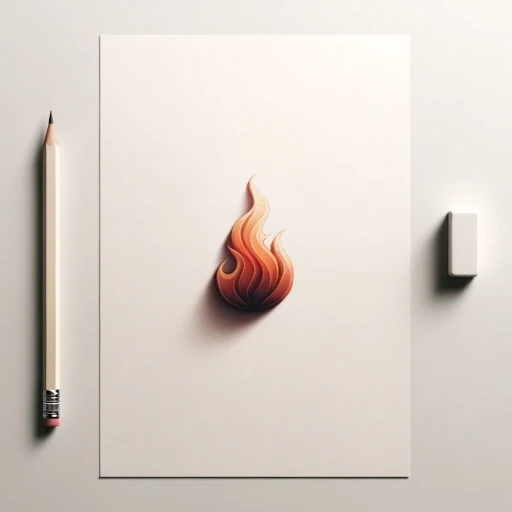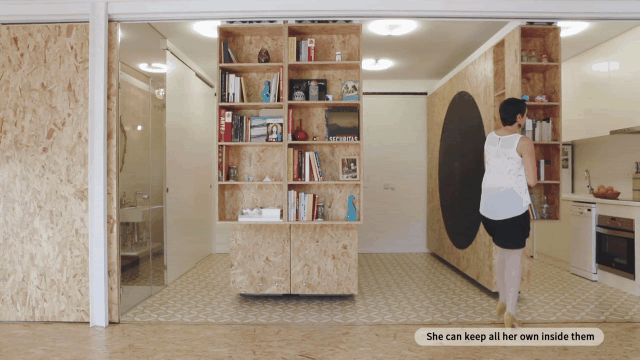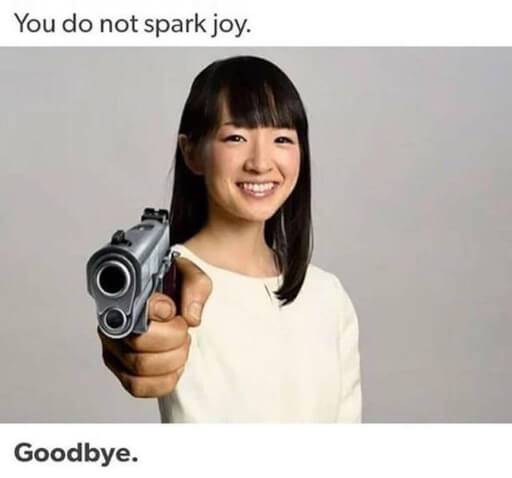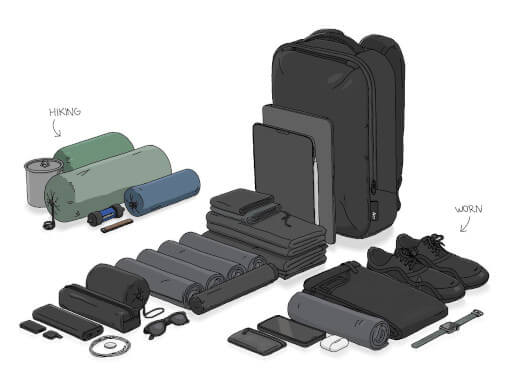Anti-Clutter
From a conversation with Dall-E 3 Beta about the text of this blog post. The original prompt:
Digital art of a white matte desk, top-down view. On the desk is a piece of paper with a drawing of a flame.
Image was cropped and resized with GIMP, then minified with Squoosh

At Apple's Wolfe campus, where Marcom resides, the elevator areas are flanked by tall banners emblazoned:
This Thoreauesque ethos is reflected in the design of the workplace: a stack of spacious, toroidal caverns sparsely furnished with large, white, sit-stand desks that are generally kept clear. I was reminded of remarks by an author whose name I can no longer recall, but whose message lingered in my head, regarding the utility of empty surfaces. They foster an uncluttered mind.
In 2020 when I was working at Wolfe, that tidiness contrasted sharply with my living space. I'm a slightly messy person by nature, and as the parent of a small child this flaw of mine was, and still is, greatly amplified. When the pandemic hit, I simmered in the clutter and struggled against its current. During that time I encountered a short documentary from UCLA which included a segment on the effects of clutter on cortisol levels:
It resonated, and it galvanized me. I carved out an oasis of cleanliness in the spare bedroom which also serves as my home office. I obtained a large, white, sit-stand desk of my own, and I keep it clear. I have developed a persistent mindfulness about clutter and its effects on my mood and mindset, and it has become a topic I return to frequently.
Throughout the pandemic I found myself watching escapist YouTube videos about tiny homes, van life, stealth camping, and other minimalist lifestyles. I admired the residents' rigorous thoughtfulness and intentionality about each item they possessed, and I was inspired by clever, multi-purpose objects I hadn't seen before and the use of custom, transformable furniture to maximize a tight space's utility.
This transforming space featured in Gizmodo resembles the compaction design of UC Berkeley's Main Stacks library.

Towards the end of the pandemic, I relocated my office into a different room which involved a complicated, multi-day process necessitating going though everything I own twice. Having to rehome objects makes you reconsider their utility - it might be better to just throw it out or donate it rather than spend that same effort to move it and burden yourself with the logistical overhead of its storage. Rehoming objects twice in quick succession makes you resent everything non-essential.

Scrounging for kindred spirits, I stumbled upon r/declutter, r/capsulewardrobe, and r/onebag. I found the same intentionality and thoughtfulness I admired before, distilled to its essence in r/onebag. This is a group of mostly digital nomads who live out of a single backpack. It's the most minimal home life possible - none whatsoever - forcing them to pour all their thoughtfulness into each article of clothing and each piece of gear. Reddit user u/jeremymaluf best exemplifies this temperament in his reflections from his personal website:
Jeremy drew this himself.

In 2015 I got rid of everything I owned that didn't fit in a laptop backpack, and I've been living at this level of minimalism ever since. The core idea is to only own what I need, which allows me to travel spontaneously, spend less, focus more, and simplify my life.
I'm reminded of an incident when I was 13, where my family home almost burned down due to a forest fire. Forced to contemplate the potential loss of all my possessions, I found the idea unexpectedly freeing.
Engulfed in the minimalist atmosphere of these YouTube videos and subreddit communities, I redirected my energies into rethinking my furniture from scratch to maximize desk space. (I also drastically downsized my wardrobe and minified my everyday accessories, both of which warrant separate posts in the near future.) I managed to squeeze 29 sqft of tabletops into a very small room. Amazon was a godsend for finding odd-shaped pieces to nestle into the nooks and crannies. To further maximize desk space, my monitors are upheld by two arms mounted to a single pole (like this), and a modesty panel with builtin wire management netting keeps the desktop cable-free. My few remaining possessions - fewer by the month - are stored in matching bins in the closet or under a tall bedframe. Though it lacks the spaciousness of Wolfe, it promotes the cleanliness of mind I sought.
Now that I am so aware of my irritability in visually busy spaces, I believe that this minimalist impulse is here to stay. I can't become a radical onebagger - not with a home, a car, and a family. The best I can do is continue to scrutinize purchases, adopt a more intentional lifestyle, and let go of nonessentials sooner. I would prefer to live in the simple, anti-materialistic way I foresaw 2 decades ago when I thought it would all catch fire.